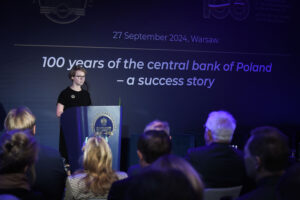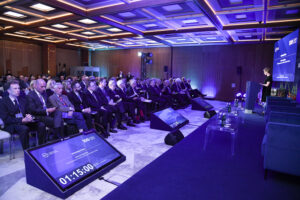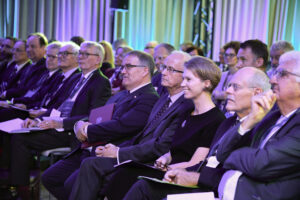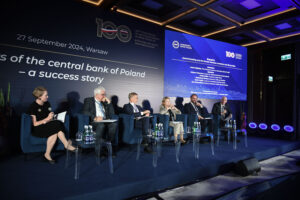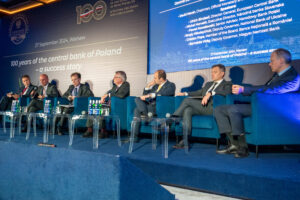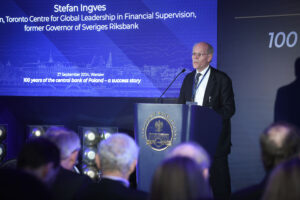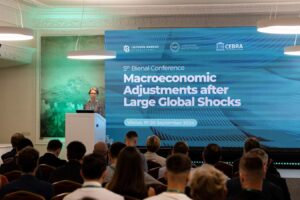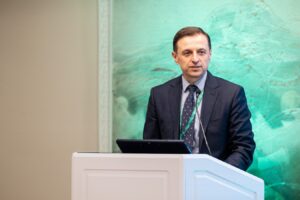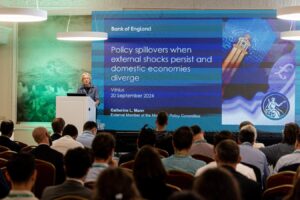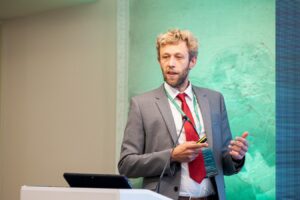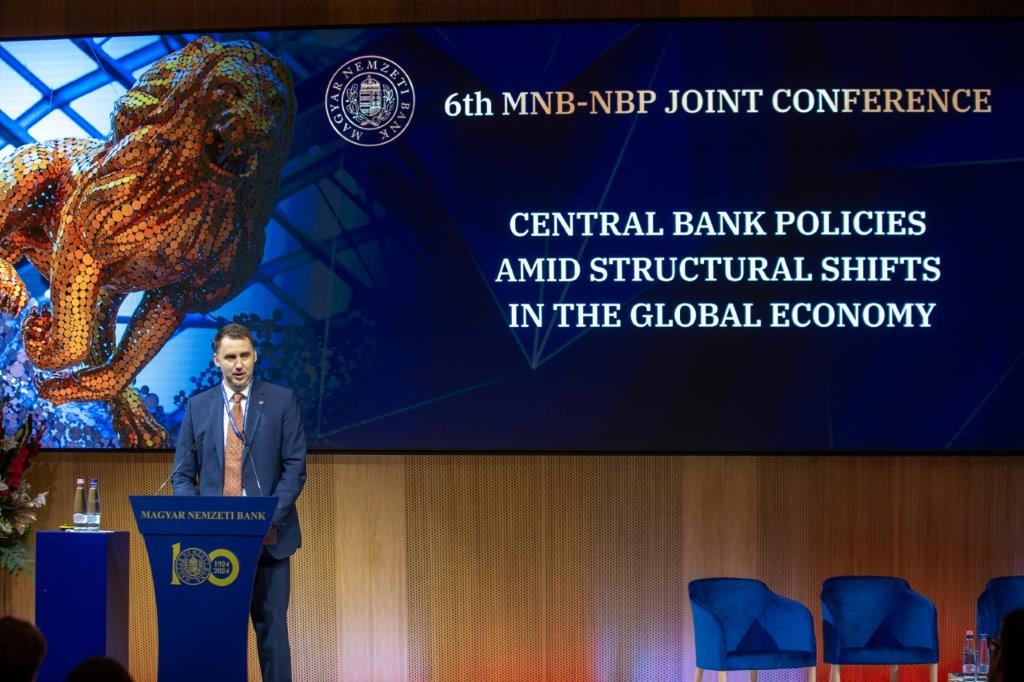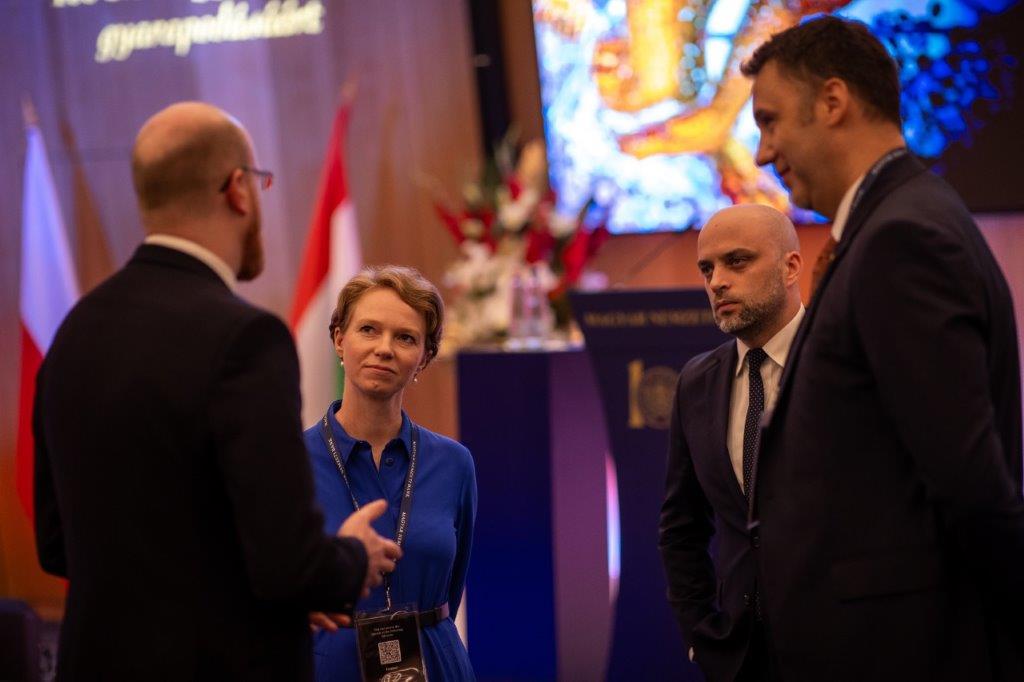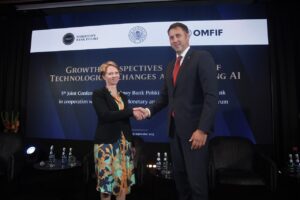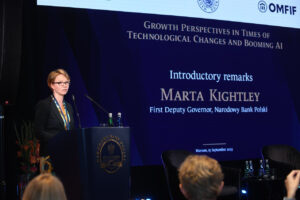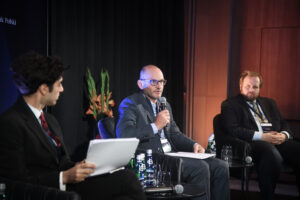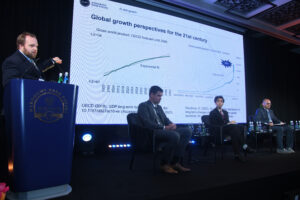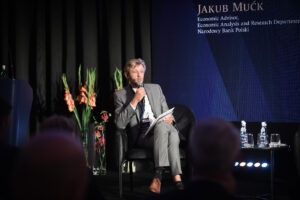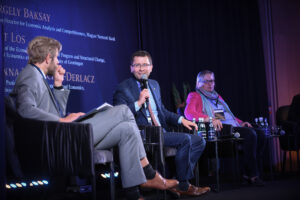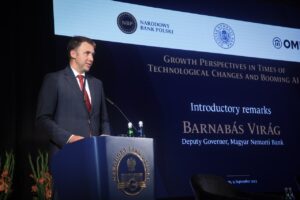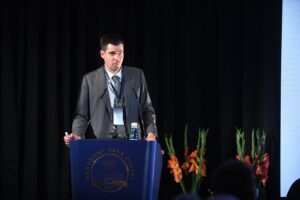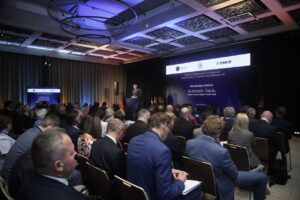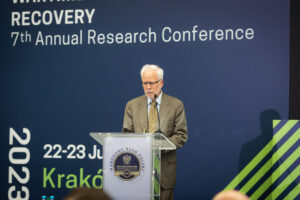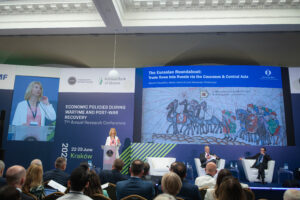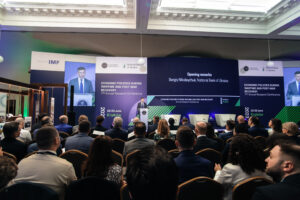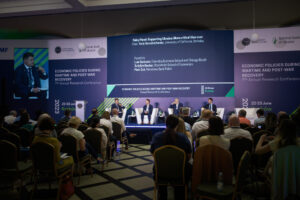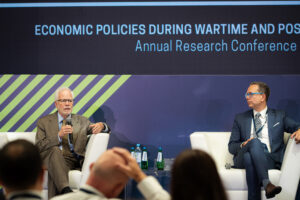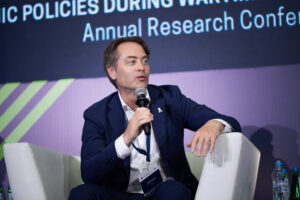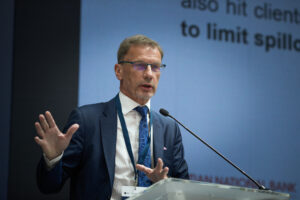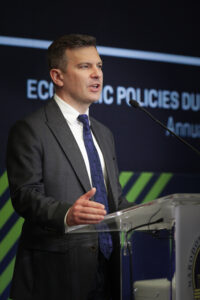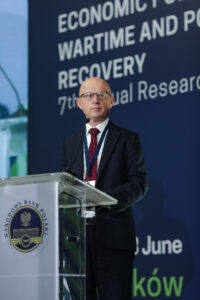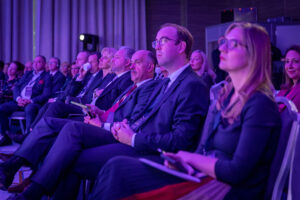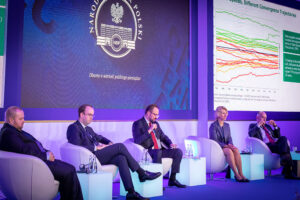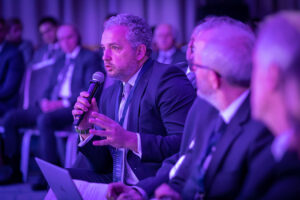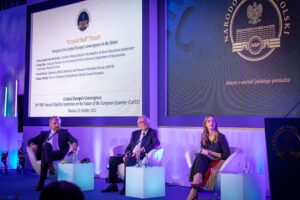Konferencje NBP
Organizacja konferencji i seminariów ma na celu zwiększenie znaczenia NBP w międzynarodowej debacie ekonomicznejOrganizacja konferencji i seminariów ma na celu zwiększenie znaczenia NBP w międzynarodowej debacie ekonomicznej
Organizacja konferencji i seminariów ma na celu zwiększenie znaczenia Narodowego Banku Polskiego w międzynarodowej debacie ekonomicznej, rozszerzenie współpracy z innymi bankami centralnymi, jak również zacieśnianie współpracy z ważnymi ośrodkami naukowymi i instytucjami międzynarodowymi. NBP aktywnie wypełnia rolę inspiratora debaty publicznej, przy wykorzystaniu różnorodnych środków i metod przekazu, m.in. właśnie poprzez działalność seminaryjno-konferencyjną. Konferencje i seminaria NBP służą podniesieniu poziomu wiedzy ekonomicznej społeczeństwa i uczestników rynków finansowych, szerzeniu i pogłębianiu wiedzy na temat roli i misji banku centralnego w życiu gospodarczym, polityki monetarnej, stabilności finansowej i szeregu innych zagadnień ekonomicznych, pozostających w kompetencjach banku centralnego.
Kompleksową organizacją międzynarodowych konferencji w Narodowym Banku Polskim zajmuje się
Wydział Konferencji Międzynarodowych, który jest częścią Departamentu Zagranicznego.
Kontakt: conference@nbp.pl
Rok 2024
Warszawa, 27 września 2024, "100 years of the central bank of Poland – a success story"
Międzynarodowa konferencja Narodowego Banku Polskiego, poświęcona stuleciu polskiej bankowości centralnej, odbyła się 27 września 2024 r. w Warszawie pod tytułem 100 years of the central bank of Poland – a success story (100 lat polskiego banku centralnego – historia sukcesu).
Motywem przewodnim konferencji było stulecie Narodowego Banku Polskiego (NBP), które przypadło na 2024 r. To właśnie w 1924 r., w pierwszych latach po odzyskaniu przez Polskę niepodległości w 1918 r., w wyniku reform przeprowadzonych przez premiera Władysława Grabskiego powstał poprzednik NBP – Bank Polski SA. W tym samym roku do obiegu weszła również polska waluta – złoty. Debata konferencyjna, inspirowana tą wyjątkową rocznicą, stanowiła próbę kompleksowego spojrzenia na przeszłość, teraźniejszość i przyszłość bankowości centralnej w Polsce i regionie.
Specjalnymi wydarzeniami konferencji były wykłady keynote, które wygłosili Stefan Ingves –prezes banku centralnego Szwecji (Sveriges Riksbank) w latach 2006–2022 oraz Charles Goodhart – wieloletni doradca Banku Anglii w zakresie polityki pieniężnej i profesor London School of Economics. W panelach dyskusyjnych wzięli udział wysocy rangą przedstawiciele banków centralnych z wielu krajów regionu:
• Austria: Robert Holzmann, prezes Oesterreichische Nationalbank,
• Chorwacja: Boris Vujčić, prezes Hrvatska narodna banka,
• Czechy: Eva Zamrazilová, zastępca prezesa Česká národní banka,
• Estonia: Madis Müller, prezes Eesti Pank,
• Litwa: Gediminas Šimkus, prezes zarządu Lietuvos bankas,
• Rumunia: Cristian Popa, członek zarządu Banca Naţională a României,
• Słowacja: Michal Horvath, dyrektor wykonawczy Národná banka Slovenska,
• Ukraina: Sergiy Nikolaychuk, zastępca prezesa, Narodowy Bank Ukrainy,
• Węgry: Barnabás Virág, zastępca prezesa Magyar Nemzeti Bank,
• EBC: Ulrich Bindseil, dyrektor generalny EBC,
oraz przedstawiciele międzynarodowych instytucji finansowych i wybitni profesorowie akademiccy:
• Harold James, profesor historii i europeistyki, Uniwersytet Princeton,
• David Marsh, prezes Official Monetary and Financial Institutions Forum (OMFIF),
• Stephen Quinn, profesor ekonomii, Teksański Uniwersytet Chrześcijański,
• William Roberds, emerytowany ekonomista i starszy doradca, Bank Rezerwy Federalnej w Atlancie,
• Stefano Ugolini, profesor nadzwyczajny ekonomii, Uniwersytet w Tuluzie.
W trakcie trzech kolejnych paneli dyskusja była poświęcona ewolucji bankowości centralnej w perspektywie historycznej, współczesnym dylematom związanym z prowadzeniem polityki pieniężnej, a także przyszłości bankowości centralnej na świecie.
Odnosząc się do początków bankowości centralnej na świecie podkreślono, że pierwotnie funkcją banków centralnych było finansowanie zadłużenia państwa, a w szczególności wydatków wojennych. Jednocześnie ewolucja bankowości centralnej dokonywała się w czasie funkcjonowania różnych modeli międzynarodowego systemu walutowego i w ramach różnych systemów kursowych. Po upadku systemu walutowego z Bretton Woods banki centralne zaczęły stosować strategię polityki pieniężnej opartej na kontroli podaży pieniądza, jednak z czasem została ona w wielu przypadkach zastąpiona strategią celu inflacyjnego. Kluczowym czynnikiem skutecznej realizacji tego typu strategii jest jednak niezależność banku centralnego.
W kontekście obchodów stulecia utworzenia Banku Polskiego SA i wprowadzenia złotego do obiegu podkreślono, że historia bankowości centralnej w Polsce jest znacznie dłuższa niż ostatnie 100 lat. Pierwszym polskim bankiem centralnym, pełniącym funkcję emisyjną i kredytową, był Bank Polski powstały w 1828 r. w Królestwie Polskim. Został zlikwidowany w 1886 r., a historia polskiej bankowości centralnej została przerwana na wiele lat. Jak wskazali uczestnicy panelu, pomimo braku ciągłości instytucjonalnej bank centralny w Polsce de facto wznowił działalność w 1924 r., do czego nawiązał również w swoim pierwszym przemówieniu prezes Banku Polskiego SA Stanisław Karpiński. Omówiono również przełomowe momenty w historii polskiego banku centralnego, którymi były lata 1924, 1945 i 1989. Oznaczały one odrodzenie się banku centralnego w odmiennych warunkach: hiperinflacji, zakończenia II wojny światowej i upadku komunizmu.
Podczas panelu poświęconego współczesnej bankowości centralnej i stojącym przed nią wyzwaniom przedstawiono wnioski płynące z doświadczeń banków centralnych podczas epizodu silnego wzrostu inflacji po pandemii COVID-19. Reakcja banków centralnych – pomimo niespodziewanie szybkiego wzrostu inflacji – okazała się odpowiednia, o czym świadczy postępująca dezinflacja i zbliżenie się stopy inflacji do poziomu celu banków centralnych. W szczególności podkreślono, że zacieśnianiu polityki pieniężnej nie towarzyszył znaczący spadek tempa wzrostu realnego PKB, a sytuacja na rynkach pracy pozostała dobra. W rezultacie udało się zrealizować scenariusz „miękkiego lądowania”. Jednocześnie przestrzeń fiskalna w wielu krajach uległa zmniejszeniu na skutek wdrożenia znaczących rozmiarów działań antykryzysowych, w związku z czym skurczyły się możliwości stymulowania wzrostu ze strony polityki fiskalnej. Problemy fiskalne są ponadto potęgowane przez sytuację demograficzną oraz wzrost wydatków na transformację energetyczną.
W trakcie trzeciego panelu przedmiotem dyskusji była przyszłość bankowości centralnej i stojące przed nią wyzwania. W szczególności zwrócono uwagę na kwestie związane z dominacją fiskalną, rozwojem sztucznej inteligencji i perspektywą wprowadzenia pieniądza cyfrowego banku centralnego (CBDC). W odniesieniu do emisji CBDC podkreślano, że zasadniczym celem tego działania jest zapobieżenie spadkowi znaczenia pieniądza banku centralnego w systemach monetarnych. Ponadto wskazano, że prace nad wprowadzeniem CBDC są podyktowane także obawami o zdominowanie systemów płatniczych przez prywatnych usługodawców. Zaznaczono również, że banki centralne nie powinny być obarczane dodatkowymi zadaniami (jak np. walka ze zmianami klimatu), które powinny pozostać domeną rządu. W przeciwnym razie skutkowałoby to osłabieniem efektywności w osiąganiu celu nadrzędnego, czyli stabilności cen. W tym kontekście kluczowa pozostaje także niezależność banku centralnego.
W konferencji wzięli udział zagraniczni i polscy ekonomiści, przedstawiciele banków centralnych i międzynarodowych instytucji finansowych oraz wybitni naukowcy i praktycy polityki gospodarczej. Podczas obrad konferencyjnych goście podkreślali osiągnięcia NBP, szczególnie w okresie pandemii i po wybuchu wojny, gratulowali jubileuszu oraz życzyli dalszych sukcesów w nadchodzących latach.
Wilno, 19–20 września 2024, 5. edycji wspólnej konferencji NBP i Banku Litwy (Lietuvos Bankas – LB)
Macroeconomic adjustments after large global shocks
Piąta edycja wspólnej konferencji Narodowego Banku Polskiego (NBP) i Banku Litwy (Lietuvos Bankas – LB) pt. Macroeconomic adjustments after large global shocks odbyła się 19–20 września 2024 r. w Wilnie.
Organizowane cyklicznie co dwa lata wydarzenie zgromadziło ekspertów z banków centralnych, instytucji finansowych i środowiska akademickiego, którzy debatowali na temat wpływu globalnych wstrząsów na gospodarkę oraz dostosowań makroekonomicznych, jakie te wyzwania ze sobą niosą. Patronat nad konferencją, jak co roku, objęło stowarzyszenie CEBRA (Central Bank Research Association).
Narodowy Bank Polski podczas 5. edycji wspólnej konferencji NBP i Banku Litwy reprezentowała delegacja, której przewodniczyła prof. Marta Kightley, Wiceprezes NBP – Pierwsza Zastępczyni Prezesa NBP. Podczas konferencji profesor Kightley i Julita Varanauskienė, Wiceprezes Banku Litwy, wygłosiły przemówienia otwierające. Ponadto przedstawiciele NBP brali udział w panelach konferencyjnych – prof. Krzysztof Makarski wprowadził do wykładu keynote prof. Jaume Ventury pt. Fixed costs, product heterogeneity and the force of competition, a prof. Michał Brzoza-Brzezina pełnił funkcję dyskutanta w sesji dotyczącej polityk gospodarczych w niepewnym otoczeniu. Dr Jakub Mućk był z kolei dyskutantem w sesji poświęconej globalnym wstrząsom.
Pierwszego dnia konferencji dyskusje w ramach sesji tematycznych były poświęcone zagadnieniom sieci powiązań gospodarczych i ich wpływom, efektywności polityki pieniężnej oraz roli sankcji gospodarczych. Drugiego dnia omówiono wyzwania dla polityki gospodarczej w obliczu niepewności oraz wpływ globalnych wstrząsów na gospodarkę.
W programie konferencji znalazły się wystąpienia omawiające wpływ wydarzeń, takich jak pandemia COVID-19 czy inwazja Rosji na Ukrainę, na gospodarki krajów, prowadzące do zakłóceń w łańcuchach dostaw, problemów energetycznych oraz gwałtownego wzrostu inflacji. Omówiono reakcje polityki monetarnej i fiskalnej na te wyzwania oraz efekty makroekonomiczne globalnych szoków, ich wpływ na gospodarstwa domowe i przedsiębiorstwa, a także mechanizmy transmisji tych szoków.
Wśród prelegentów znaleźli się wybitni przedstawiciele świata nauki oraz praktycy z międzynarodowych instytucji finansowych. Wydarzenie podsumowały wystąpienia prof. Jaume Ventury (CREI, UPF, BSE), prof. Olega Itskhokiego (Harvard University) oraz Catherine L. Mann (Bank of England), którzy w swoich wykładach keynote przybliżyli najważniejsze aspekty globalnych zmian makroekonomicznych i ich wpływ na politykę pieniężną.
Konferencja stanowiła doskonałą platformę wymiany myśli oraz doświadczeń w zakresie makroekonomii, polityki pieniężnej oraz międzynarodowych stosunków gospodarczych. Wzmocniła także dobre stosunki bilateralne pomiędzy bankami centralnymi Polski i Litwy.
Warszawa, 12-13 września 2024, Shaping a New Reality of Cash Conference 2024
Shaping a New Reality of Cash Conference 2024
“New normal” – old challenges?
Narodowy Bank Polski conference
Warsaw, 12-13 September 2024
Call for Papers
Narodowy Bank Polski (NBP) is organising its forthcoming scientific conference focused on cash and cash market phenomena. The key objective of the conference is to encourage the representatives of central banks and other public institutions, as well as researchers, to discuss the most up-to-date issues related to cash and its changing economic and social role. The aim is to share knowledge focused on cash-related phenomena observed in various countries. We believe that such an international discussion will allow a better understanding of the challenges that cash may face in the future.
The topics to be covered during the conference include, but are not limited to:
- The role of cash in the economy (microeconomic and macroeconomic perspective);
- Cash in an era of digitalization;
- The role of cash in society, its evolution and challenges;
- Demand for cash and its forecasting;
- Cash management;
- Optimal payment mix and changes in payment habits;
- Transaction and non-transaction motives for holding cash;
- Access to and availability of cash;
- Cash acceptance;
- Costs of cash;
- Cash withdrawals and cash deposits;
- Cash quality and recirculation.
Papers related to other aspects of cash circulation will also be considered.
Submission of abstracts
We invite experts from central banks, other institutions and academia to submit their papers. We will consider all papers and abstracts focused on cash-related issues. Each submitted abstract will be reviewed by the conference committee.
Abstracts should be 200-300 words long. Each submitted abstract should also include:
- Titles and full names of all authors;
- Title of the paper;
- Full affiliations of all authors;
- Contact person, with full contact details (email, postal address);
- Key words and JEL codes.
To have a paper considered for inclusion in the conference, please submit either an abstract or a full paper to CashConference@nbp.pl.
Important dates:
07.04.2024 – abstract submission deadline
28.04.2024 – author notification
05.06.2024 – registration open
30.06.2024 – registration deadline
15.07.2024 – registration confirmation
12-13 September 2024 – conference
General schedule:
11.09.2024 (in the evening): welcome reception;
12.09.2024: conference and social programme, including an official dinner;
13.09.2024: conference; in the afternoon/evening – participants’ departure.
A detailed schedule will be announced after submission of papers and selection of speakers.
Should you have any questions, please contact the Organising Committee:
Cash and Issue Department
Narodowy Bank Polski
CashConference@nbp.pl
phone: +48 22 185 45 79
Kijów, 20-21 czerwca 2024, 8th Joint NBU-NBP 2024 Annual Research Conference
8th Joint NBU-NBP 2024 Annual Research Conference
On 20–21 June 2024, the 8th Annual Research Conference organized jointly by Narodowy Bank Polski (NBP) and the National Bank of Ukraine (NBU) with the support of the International Monetary Fund (IMF) and the USAID Investment for Business Resilience Activity, titled Navigating the Changing Landscape: Central Banks in a New Normal, took place in Kyiv.
The first day featured research sessions held online. The second day allowed participants to join panel discussions in-person or online.
At the joint NBP-NBU conference in Kyiv, NBP was represented by Paweł Szałamacha, Member of the Management Board.
The purpose of the conference was to create a forum for the discussion and exchange of ideas and experiences among the representatives of central banks, financial institutions, and leading universities from Ukraine, Poland, the US, the UK, Ireland, Belgium, Switzerland, Moldova, Lithuania, Canada, and other countries. The conference was attended in person by over 137 high-level representatives of central banks and international financial institutions as well as renowned scholars and economic policy makers. Additionally, 317 participants from 29 countries joined the conference online.
The conference addressed strategies that central banks could apply to effectively manage the economic consequences of the war in Ukraine and related current challenges.
During the first conference day, devoted to research, representatives of the IMF, the European Central Bank (ECB), the central banks of the US, Canada, Poland, Moldova, and Ukraine, the Bank for International Settlements (BIS), the Center for Research on International Economics (CRIE), and Western universities presented their research on the following topics: the effects of large and asymmetric shocks on economic development, the relationship between monetary policy and financial stability, constraints of the monetary policy transmission mechanism, the role of fiscal policy in safeguarding macrofinancial stability, and innovative tools and new areas of central banking
The second conference day, devoted to the practical aspects of macroeconomic policy, was inaugurated by Paweł Szałamacha, Member of the Management Board of NBP, who delivered the introductory remarks alongside Andriy Pyshnyy, Governor of NBU, Uma Ramakrishnan, Deputy Director in the European Department at the IMF, and Jeffrey Lehrer, Acting Deputy Mission Director at USAID Ukraine.
There were three panel discussions: Panel I: Challenges for a Central Bank in New Normal, where Paweł Szałamacha, Andriy Pyshnyy and Gediminas Šimkus, Governor of the Bank of Lithuania were speakers, Panel II: Towards Recovery: Sanctions, Reparations, and Use of Seized Assets, and Panel III: Post-War Recovery through European Integration.
Among the speakers on the second conference day there were also representatives of the IMF, the U.S. Embassy and the EU Delegation to Ukraine, the central banks of Lithuania, Poland, and Ukraine, the Ukrainian government, the Peterson Institute for International Economics, the Bruegel Information and Analytical Center, OGResearch consulting company, and the Kyiv School of Economics. The discussion was enriched by Ukrainian and foreign experts, scholars, and professors.
Notable moments at the conference included two keynote lectures delivered by Frank Smets, Adviser to the Counsel to the Executive Board at the ECB, and Gita Gopinath, First Deputy Managing Director of the IMF.
The conference programme and its streaming are available on the website: Annual Research Conference ARC 2024.
Budapeszt, 10 czerwca 2024, 6. wspólna konferencja NBP i MNB
Central bank policies amid structural shifts in the global economy
10 czerwca w Budapeszcie odbyła się 6. wspólna konferencja Narodowego Banku Polskiego (NBP) i Magyar Nemzeti Bank (MNB). Konferencja pt. Central bank policies amid structural shifts in the global economy była kolejną odsłoną cyklu konferencji, który NBP i MNB zapoczątkowały w 2018 r., goszcząc przedsięwzięcie naprzemiennie w Polsce i na Węgrzech.
Celem tegorocznej konferencji, osadzonej w kontekście zmian strukturalnych zachodzących w gospodarce światowej i ich skutków dla gospodarek oraz banków centralnych krajów regionu, było stworzenie forum wymiany opinii pomiędzy bankowcami centralnymi. W konferencji wzięli udział wysokiej rangi przedstawiciele banków centralnych i międzynarodowych instytucji finansowych oraz praktycy polityki gospodarczej, a także przedstawiciele podmiotów inwestycyjnych.
Przemówienia otwierające wygłosili kolejno Barnabás Virág, wiceprezes MNB, i Marta Kightley, Wiceprezes NBP – Pierwszy Zastępca Prezesa NBP.
Specjalnym wydarzeniem konferencji był wykład, który wygłosił Álvaro Santos Pereira, główny ekonomista Organizacji Współpracy Gospodarczej i Rozwoju (OECD) na temat wyzwań ostatniej dekady, omawiając pożądane kierunki działań regulacyjnych z zakresu polityki ekonomicznej, które mogą pozytywnie wpływać na wzrost gospodarczy, zatrudnienie i rozwój społeczny.
Dalsza część konferencji została podzielona na trzy sesje panelowe.
Podczas pierwszej sesji Piotr Żuk (NBP) moderował debatę, w której udział wzięli András Balatoni (MNB), Geoff Gottlieb (IMF), Richard Grieveson (wiiw) oraz Julia Wörz (b.c. Austrii). Ci znamienici bankowcy centralni i ekonomiści omawiali tematykę sesji „Integration and convergence in a restructuring global economy”, poświęconej integracji i konwergencji w restrukturyzującej się globalnej gospodarce. Podkreślili, że chociaż pandemia COVID-19 i rosyjska agresja na Ukrainę wpłynęły negatywnie na globalne łańcuchy dostaw, to pojawiły się nowe trendy, takie jak near-shoring i friend-shoring, otwierając nowe możliwości dla regionu, o ile zwiększy on swoją konkurencyjność poprzez rozwój technologii, cyfryzację, transformację sektora energetycznego oraz adaptację do zmian demograficznych.
Drugą sesję, zatytułowaną „The evolving role of central banks in the decade of challenges”, dedykowaną ewoluującej roli banków centralnych w dekadzie wyzwań, moderował Ádám Banai (MNB). W debacie uczestniczyło czworo panelistów reprezentujących banki centralne regionu, Joanna Niedźwiedzińska (NBP), Tomáš Straňák (b.c. Słowacji), Iikka Korhonen (b.c. Finlandii) oraz Csaba Bálint (b.c. Rumunii). Poruszyli oni takie aspekty, jak oczekiwania co do kształtowania się naturalnej stopy procentowej w dłuższej perspektywie, znaczenie uwarunkowań instytucjonalnych dla skuteczności polityki pieniężnej, czy rolę badań ekonomicznych w lepszym rozumieniu wyzwań stojących przez bankami centralnymi.
W trzeciej sesji „Views from investor on CEE”, poświęconej krajom Europy Środkowej z perspektywy inwestorów, którą moderował Ugras Ulku (Institute of International Finance – IIF), udział wzięli przedstawiciele podmiotów inwestycyjnych: Mark Patrick (TIAA), Stephen Elgie (Argo Capital Management), Philipp Mayer (Erste Group Bank AG) i Holger Sandte (Danish Export and Investment Fund). Omówili oni atrakcyjność inwestycyjną naszego regionu i wyzwania przed nim stojące.
Debata konferencyjna potwierdziła, że zmiany strukturalne zachodzące w gospodarce na poziomie globalnym mają wpływ na kierunki rozwoju regionu Europy Środkowej oraz na współczesne rozumienie roli banków centralnych.
Rok 2023
Warszawa, 29-30 listopada 2023, Recent trends in the real estate market and its analysis, 2023 edition
Narodowy Bank Polski (NBP) and SGH Warsaw School of Economics recently organized a conference, along with an NBP international workshop, to delve into current issues in the field of real estate analysis from the central bank’s perspective. The discussions encompassed the development of residential real estate prices, commercial real estate prices, and real estate financing. The event targeted researchers from academia, private firms, and central banks.
The workshop extensively covered a range of topics, including but not limited to:
- The impact of monetary, fiscal, and macroprudential policies on real estate finance and the development of the market;
- Monitoring and modelling of real estate cycles (demand and supply), with a focus on the shocks that the COVID-19 pandemic and the Russian War in Ukraine generated;
- The development of property rents and prices, their modelling and analysis;
- A new approach to real estate analysis (i.e., urban economics and regional studies, spatial analysis, sociological and behavioural aspects in the real estate decision-making process, filtration, the ripple effect, gentrification, etc.);
- The modelling and measurement of mutual relationships between housing, commercial real estate, and the economy.
Venue:
29-30 November 2023
SGH Warsaw School of Economics (Building C)
Al. Niepodległości 128, Warszawa
In case of any questions please contact:
International Department
International Conferences Division
Narodowy Bank Polski
conference@nbp.pl
Financial Stability Department
Real Estate Market Analyses Division
Narodowy Bank Polski
realestateworkshop@nbp.pl
Presentations
Eva Arnold; Banks through the Lens of the Media
Adam Czerniak; Impact of Ukrainian refugees migration on rental prices across Europe
Marco Lo Duca; Mortgage supply and house prices: a BVAR analysis for the Euro area
Artur Gajda; Preferences of tenants in the Polish housing market
Barbara Jarmulska; Asset prices, collateral and bank lending: the case of Covid-19 and real estate
Jan Klacso; The National Bank of Slovakia Residential Real Estate Dashboard
George Matysiak; New approaches towards classifying unlisted commercial real estate funds (UCREF)
Giorgia de Nora; Institutional investors and house prices
Jean-Pierre Schaefer; Producing social housing despite the current economic and political turbulence
Karin Wagner; Housing markets from the perspective of households: Selective survey data evidence
Borek Vasicek; Housing market surveillance in the European Commission
Stefen Zeugner; MAPADOMO A regional housing market database for the EU Stefen Zeugner
Warszawa, 20 października 2023, 11. konferencja międzynarodowa NBP – „Investment for Growth”
Jedenasta edycja flagowej konferencji międzynarodowej NBP poświęconej przyszłości gospodarki europejskiej – „Conference on the Future of the European Economy” (CoFEE) – odbyła się 20 października 2023 r. w Warszawie pod hasłem „Investment for Growth”.
W konferencji wzięło udział niemal 160 uczestników, m.in. ekonomiści, przedstawiciele banków centralnych i międzynarodowych instytucji finansowych oraz wybitni naukowcy i praktycy polityki gospodarczej. Tegoroczne spotkanie pod hasłem Investment for Growth było próbą odpowiedzi na pytanie: dlaczego poziom inwestycji w wielu państwach europejskich, zwłaszcza w Europie Środkowej, jest niezadowalający oraz jakie środki z zakresu polityki gospodarczej należałoby zastosować w celu ich pobudzenia?
Przemówienie otwierające wygłosiła Marta Kightley, wiceprezes NBP, która odnosząc się do tematyki konferencji, podkreśliła, że z jednej strony inwestycje są motorem wzrostu gospodarczego i konwergencji, ale z drugiej strony rosnąca gospodarka tworzy bardziej atrakcyjne warunki dla dalszych inwestycji. Zwróciła też uwagę, że – w kontekście wojny w Ukrainie – najpilniejsze potrzeby inwestycyjne Europy Środkowej dotyczą aktualnie obronności, przebudowy sektora energetycznego oraz wsparcia socjalnego dla uchodźców z Ukrainy, której najbliższymi sąsiadami, bliższymi geograficznie niż państwa „starej” UE, są właśnie kraje Europy Środkowej.
Z kolei Odile Renaud-Basso, prezes Europejskiego Banku Odbudowy i Rozwoju, który jest jednym z największych inwestorów instytucjonalnych w Polsce, w swoim wystąpieniu podkreśliła, że podwyższenie wartości inwestycji w relacji do PKB, szczególnie w krajach Europy Środkowej, jest kluczową determinantą wzrostu gospodarczego. Prezes EBOR wymieniła ponadto najpilniejsze wyzwania inwestycyjne stojące przed Polską i krajami regionu.
Konferencja składała się z trzech sesji dyskusyjnych. Pierwsza była poświęcona omówieniu czynników kształtujących wzrost w Europie, druga – politykom europejskim i krajowym mającym na celu pobudzenie inwestycji, natomiast ostatnia sesja, zwana Crystal Ball, stanowiła próbę odpowiedzi na pytanie: co wyróżnia Europę Środkową i dlaczego wskaźnik inwestycji do PKB jest zaskakująco niski w wielu państwach tego regionu, mimo że ich PKB na mieszkańca zbliża się do średniej unijnej?
W tym roku zaproszenie do udziału w konferencji w roli moderatorów sesji przyjęli: Gediminas Šimkus – prezes zarządu Lietuvos bankas, Jan Frait – zastępca prezesa Česká národní banka oraz David Marsh – prezes i współzałożyciel londyńskiego think tanku OMFIF (Official Monetary and Financial Institutions Forum).
Prezentacje
Jan Frait
Session I: Factors shaping growth in Europe – a stocktaking
Patrick Bisciari
Economic growth and productivity gains in the EU
Magdolna Sass
Session I. Factors shaping growth in Europe – a stocktaking
Marzenna Weresa
Factors shaping growth in Europe: Focus on Innovation
Iain Begg
Stimulating growth. Who? How?”
Marco Buti
European and national policies to stimulate growth/investment
Birgit Niessner
Session II. European and national policies to stimulate growth/investment
Christos Pitelis
Fabrizio Coricelli
Investments, convergence, and capital inflows in Central Eastern Europe
Mario Holzner
What is special about investment in Central Europe?
Jacek Kotłowski
What is special about Central Europe?
Cristina Savescu
Macro and micro perspectives on investment
Warszawa, 15 września 2023, 5. wspólna konferencja NBP i MNB we współpracy z OMFIF
5. wspólna konferencja NBP i MNB we współpracy z OMFIF
pt. Growth Perspectives in Times of Technological Changes and Booming AI
15 września w Warszawie odbyła się 5. wspólna konferencja Narodowego Banku Polskiego (NBP) i Magyar Nemzeti Bank (MNB) zorganizowana we współpracy z Official Monetary and Financial Institutions Forum (OMFIF). Konferencja pt. Growth Perspectives in Times of Technological Changes and Booming AI była kolejną odsłoną cyklu konferencji, który banki centralne Polski i Węgier zapoczątkowały w 2018 roku, goszcząc przedsięwzięcie naprzemiennie w Warszawie i Budapeszcie.
Celem tegorocznej konferencji, osadzonej w kontekście wszechobecności sztucznej inteligencji (AI) i jej implikacji ekonomicznych, było stworzenie forum dla debaty oraz wymiany opinii pomiędzy bankowcami centralnymi i teoretykami ekonomii. Głównym tematem dyskusji był wpływ innowacji cyfrowych i AI na globalny wzrost gospodarczy. W mocy algorytmów sztucznej inteligencji pokłada się wielkie nadzieje: że mogą zrewolucjonizować pracę, zautomatyzować szereg zadań i zwiększyć produktywność, a tym samym przeciwdziałać spodziewanemu spowolnieniu gospodarczemu, stanowiąc przeciwwagę dla malejących wskaźników wzrostu populacji. Nie wiadomo jednak, czy i jakim kosztem te nadzieje się spełnią?
W konferencji wzięło udział ponad 100 wysokiej rangi przedstawicieli banków centralnych i międzynarodowych instytucji finansowych oraz wybitnych naukowców i praktyków polityki gospodarczej.
Przemówienia otwierające wygłosili Marta Kightley, Wiceprezes NBP – Pierwszy Zastępca Prezesa NBP, a także Barnabás Virág, wiceprezes MNB.
Specjalnym wydarzeniem konferencji był wykład, który wygłosił Anton Korinek, profesor ekonomii na Uniwersytecie Wirginii, związany z tamtejszą wyższą szkołą przedsiębiorczości Darden School of Business, będący uznanym w świecie ekspertem w dziedzinie ekonomiki AI. Profesor Korinek wyraził przekonanie, że górna granica możliwości AI właściwie nie istnieje, że już teraz dostępne funkcje AI mogą znacznie ułatwiać pracę umysłową, oraz że dalsze postępy AI z dużym prawdopodobieństwem pobudzą produktywność i wzrost gospodarczy.
Dalsza część konferencji została podzielone na dwie sesje panelowe, po każdej z których prelegenci odpowiadali na pytania od publiczności. Podczas pierwszej sesji Ádám Banai (MNB) moderował debatę, w której udział wzięli Jakub Growiec (NBP), Julian Jacobs (OMFIF) oraz Francesco Venturini (Uniwersytet w Perugii). Ci znamienici bankowcy centralni i ekonomiści akademiccy omawiali tematykę sesji „Global Growth Perspectives in a World of Digital Innovation and AI”, czyli perspektywy globalnego wzrostu gospodarczego w świecie innowacji cyfrowych i AI, w tym takie zagadnienia, jak różne prognozy globalnego wzrostu gospodarczego w XXI w. (m.in. zakładające nadejście tzw. silnej sztucznej inteligencji – AGI), nierówności przestrzenne w rozwoju branży AI oraz wpływ rozwoju AI na produktywność i jej efekty redystrybucyjne w Europie. Drugą sesję, zatytułowaną „Perspectives for the CEE Region”, czyli perspektywy dla regionu Europy Środkowo-Wschodniej, moderował Jakub Mućk (NBP). W debacie uczestniczyło troje prelegentów, Gergely Baksay (MNB), Bart Los (Uniwersytet w Groningen) oraz Joanna Wolszczak-Derlacz (Politechnika Gdańska), poruszając takie aspekty tematu sesji, jak wyzwania dla wzrostu gospodarczego w regionie, w tym niekorzystne trendy demograficzne (niska dzietność, starzenie się populacji), specjalizacja funkcjonalna w globalnych łańcuchach wartości (GVC) oraz badania empiryczne ukazujące, jak integracja z GVC i wdrażanie nowoczesnych technologii wpływają nie tylko na wynagrodzenia, ale także na warunki pracy.
Debata konferencyjna potwierdziła, że AI ma ogromny wpływ na współczesne myślenie o gospodarce.
Prezentacje:
Anton Korinek
Transformative Advances in AI and Implications for Economic Policy
Ádám Banai
Global growth perspectives in a world of digital innovation and AI
Jakub Growiec
Global Growth Perspectives in a World of Digital Innovation and AI
Julian Jacobs
Spatial Inequality in AI Industry Growth
Francesco Venturini
Development of AI: Productivity and distributive effects in Europe
Gergely Baksay
Challenges of economic growth in the decade of tensions
Bart Los
Functional Specialization in Global Value Chains
Joanna Wolszczak-Derlacz
The joint impact of GVC and digital progress on job quality in Europe
Kraków, 22-23 czerwca 2023, 7. Annual Research Conference of NBP and NBU
Joint 7th Annual Research Conference of Narodowy Bank Polski and the National Bank of Ukraine organized with the support of the International Monetary Fund titled Economic Policies during Wartime and Post-War Recovery
22-23 June 2023, Kraków
On 22–23 June 2023, the 7th Annual Research Conference organized jointly by NBP and the National Bank of Ukraine with the support of the International Monetary Fund, titled Economic Policies during Wartime and Post-War Recovery, was held in Kraków, Poland.
The purpose of the conference, which was organized in the Regional Branch of NBP in Kraków, in the context of the ongoing Russian aggression against Ukraine, was to create a forum for the discussion and exchange of ideas and experiences between the central bankers, policy makers and academic economists on the design and implementation of policies to support the economy during the war and to facilitate recovery after the war. The conference was attended by over 130 high-level representatives of central banks and international financial institutions as well as renowned scholars and economic policy makers.
The need for the conference like this was obvious, considering the full-scale Russian invasion on Ukraine on 24 February 2022 which has resulted in huge human losses and massive economic damage. Through its targeted destruction of public infrastructure and private capital, Russia has damaged the foundation of Ukraine’s economy still reeling after the COVID-19 pandemic. The ensuing internal displacement and emigration further reinforce the loss of productive capacity. Even though swift action by key policy institutions and international support have limited and partially reversed the negative effects of war, still much work remains to be done to restore the long-term potential of the Ukrainian economy while rebuilding damaged cities and communities.
The conference was opened by Paweł Szałamacha, Member of the Management Board of NBP, who delivered the introductory remarks along with Sergiy Nikolaychuk, Deputy Governor of NBU, and Vahram Stepanyan, the IMF Resident Representative to Ukraine. The event was organized into academic sessions during which notable economic scholars, including Beata Javorcik, Fabio Ghironi, and Aaron Mehrotra, shared their recent work. The range of topics discussed during the conference was broad: from the interactions of fiscal and monetary policies during large and persistent shocks, to the impact of war and economic sanctions on international trade, output, and inflation, to the discussions on the present situation and the future of Ukraine.
Beata Javorcik from EBRD presented a detailed analysis of how trade sanctions imposed on Russia impact import and export volumes to Russia and neighbouring countries. She showed that while trade volumes with Russia with regard to sanctioned goods have dropped significantly, they have been partly shifted to Russia’s neighbouring countries. Fabio Ghironi from the University of Washington in Seattle presented a theoretical analysis of the results of imposing financial sanctions, international trade sanctions, and a ban on energy (gas) trading, while highlighting the importance of international coordination of sanctions and the difficulty of accomplishing it. Jakub Mućk from NBP communicated empirical research findings regarding the effects of supply chains disruptions on inflation. He showed that these disruptions are pro-inflationary and their effect on inflation builds up gradually (at a moderate pace) and is quite persistent, which means that supply chain disruptions are much more important in explaining inflation changes at medium rather than short forecast horizon. What is more, disruptions are relatively more important for the goods price inflation and impact goods price inflation more than services inflation. Mihnea Constantinescu of NBU discussed very real problems of forecasting and nowcasting of GDP in Ukraine during the war, while presenting a solution based on alternative indicators and a machine-learning approach. During the academic session devoted to economic policy making, Jesper Linde from IMF, Mishel Gassibe from the Barcelona School of Economics, and Aaron Mehrotra from BIS presented the results of their theoretical research on the impact and effectiveness of selected fiscal and monetary policy tools for fighting inflation or low product.
The sessions were followed by policy panels devoted to international support and help for Ukraine and its people as well as the priorities of post-war economic policy, featuring experienced central bankers and economic policy makers such as Stefan Ingves, former long-term governor of Sveriges Riksbank, and Luis Garicano from the London School of Economics, to name just a few.
Among highlights of the conference were two keynote lectures by Boris Vujčić, governor of Hrvatska Narodna Banka, and Barry Eichengreen, professor of economics and political science at the University of California, Berkeley. Boris Vujčić gave an account of Croatia’s economic policy during its post-war restoration after the Croatian War of Independence, fought from 1991 to 1995. Then Professor Eichengreen presented a detailed analysis of West Germany’s restoration process after the Second World War. He also compared the economic and geopolitical situations of Germany and Ukraine and discussed possible similarities and differences in their post-war restoration.
The conference programme, presentations and its streaming are available on the website: Research Conference (bank.gov.ua).
